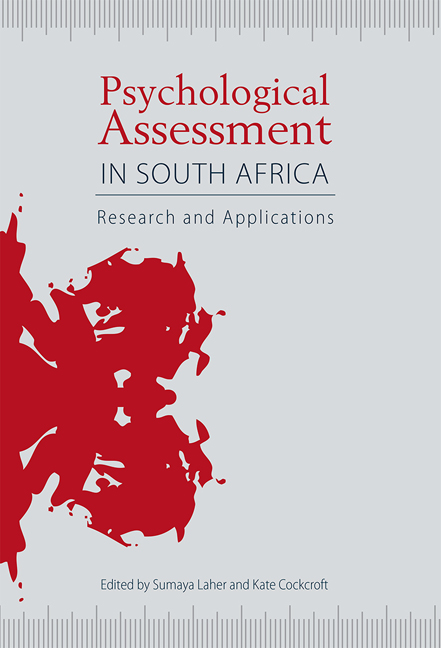Book contents
- Frontmatter
- Contents
- Tables and figures
- Acknowledgements
- Acronyms and abbreviations
- 1 Contextualising psychological assessment in South Africa
- Section One Cognitive tests: conceptual and practical applications
- 2 WAIS-III test performance in the South African context: extension of a prior cross-cultural normative database
- 3 WISC-IV test performance in the South African context: a collation of cross-cultural norms
- 4 The Senior South African Individual Scales – Revised: a review
- 5 Assessing school readiness using the Junior South African Individual Scales: a pathway to resilience
- 6 School readiness assessment in South Africa
- 7 The Kaufman Assessment Battery in South Africa
- 8 The Das-Naglieri Cognitive Assessment System
- 9 Dynamic assessment in South Africa
- 10 The Learning Potential Computerised Adaptive Test in South Africa
- 11 APIL and TRAM learning potential assessment instruments
- 12 The Griffiths Mental Development Scales: an overview and a consideration of their relevance for South Africa
- 13 Neuropsychological assessment in South Africa
- Section Two Personality and projective tests: conceptual and practical applications
- Section Three Assessment approaches and methodologies
- Contributors
- Index
3 - WISC-IV test performance in the South African context: a collation of cross-cultural norms
from Section One - Cognitive tests: conceptual and practical applications
Published online by Cambridge University Press: 21 April 2018
- Frontmatter
- Contents
- Tables and figures
- Acknowledgements
- Acronyms and abbreviations
- 1 Contextualising psychological assessment in South Africa
- Section One Cognitive tests: conceptual and practical applications
- 2 WAIS-III test performance in the South African context: extension of a prior cross-cultural normative database
- 3 WISC-IV test performance in the South African context: a collation of cross-cultural norms
- 4 The Senior South African Individual Scales – Revised: a review
- 5 Assessing school readiness using the Junior South African Individual Scales: a pathway to resilience
- 6 School readiness assessment in South Africa
- 7 The Kaufman Assessment Battery in South Africa
- 8 The Das-Naglieri Cognitive Assessment System
- 9 Dynamic assessment in South Africa
- 10 The Learning Potential Computerised Adaptive Test in South Africa
- 11 APIL and TRAM learning potential assessment instruments
- 12 The Griffiths Mental Development Scales: an overview and a consideration of their relevance for South Africa
- 13 Neuropsychological assessment in South Africa
- Section Two Personality and projective tests: conceptual and practical applications
- Section Three Assessment approaches and methodologies
- Contributors
- Index
Summary
The Wechsler Intelligence Scales have led the way in assessment of intelligence for almost seven decades, since the release of the original Wechsler-Bellevue Intelligence Scale in 1939 (Saklofske, Weiss, Beal & Coalson, 2003). Despite exemplary characteristics of other new and revised versions of intelligence tests, the Wechsler tests remain, and in the foreseeable future are likely to remain, the most widely used standardised measures for individual testing of children and adults worldwide, covering the age range from 2.5 to 89 years (Flanagan & Kaufman, 2009). The intermediate age ranges are catered for by the Wechsler Intelligence Scale for Children (WISC) which, when first released in 1949, marked the division of the Wechsler Intelligence Scales into separate tests for children and adults (Saklofske et al., 2003).
The WISC has gone through two previous revisions (WISC-R, 1974; WISCIII, 1991) prior to the most recently released version of the WISC-IV (Wechsler, 2003; 2004) that is intended for use with children aged 6 years to 16 years 11 months. The current version of the test was revised to keep up with changes in norms as population scores become inflated over time (known as the Flynn effect), as well as to ensure that test items remain current and unbiased (Prifitera, Weiss, Saklofske & Rolfhus, 2005). It also encompasses a fundamental theoretical shift, as it was designed with current trends in factor analysis theories in mind and thereby is considered to have introduced stronger psychometric properties (Baron, 2005). The test remains a good measure of g (the general intelligence factor) and consistently measures the same constructs across age groups 6 to 16 (Keith, Fine, Taub, Reynolds & Kranzler, 2006). The results of the US standardisation confirmed that the WISC-IV achieved high levels of reliability, with test-retest reliability being at least .76, but mostly in the .80s, and with subtest scores being less stable compared to Index scores and the Full Scale Intelligence Quotient (FSIQ); convergent validity with preceding editions of the Wechsler tests, including the WISC-III, yielded correlations from at least .73, but mostly in the high .70s and high .80s (Wechsler, 2003).
Based on new neurological models of cognitive function, the WISC-IV's main departure from the traditional Wechsler model is that it improves on the test's ability to evaluate perceptual reasoning, working memory and processing speed (Wechsler, 2003).
- Type
- Chapter
- Information
- Psychological Assessment in South AfricaResearch and Applications, pp. 33 - 47Publisher: Wits University PressPrint publication year: 2013



